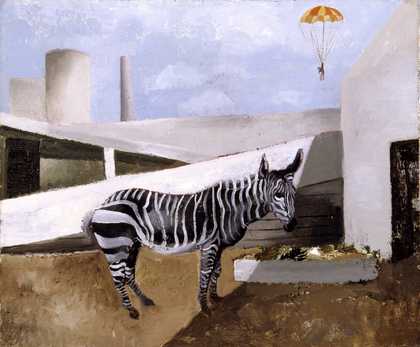
Christopher Wood
Zebra and Parachute (1930)
Tate
Since my childhood in Caracas, modern buildings have dominated my environment. The humidity, blinding light and vegetation protruding up through the cracks in the concrete frame the mix of the tropical with modernity - our main identity. The Villa Savoye is ours as much as the unfinished and bold building of El Helicoide, and the strangeness of belonging to an alien world in its own space. The delirium that conditions us to live between the sea and the mountains, the shacks and the highway, or between the repeating take-off-and-landing to nowhere.
I studied in the first modern school of the city, where my classmates and I came from immigrant or mixed families. My early relationships were in large classrooms that opened on to gardens, frequently soaked by torrential rains. Modernity, for me, was the plural and the democratic, but also the cruel, the inefficient and the wet.
As a teenager, my artistic and sexual interests developed in tandem, forged in residual spaces of modernity. At the public university built by Carlos Raúl Villanueva, full of masterful artworks, my furtive and sweating moments converged. Modernity was a communicating space, a stage of thought and happening, poetry and fluidity. It was the space where the aesthetic met the visceral. But suddenly, my own modernity was crushed by social disenchantment and military experience. The spaces of the city become targets and trenches. Immediately, modernity becomes a patriot, a bastion, a confrontation, a crowd, a parachute, a ruin, a graveyard and a frustrating negotiation.
As an adult, I moved to Europe, and from a distance I now see a new relationship with my tropical modernity. So going back and forth, it strikes me as transgressive and conservative, as black and white in a domesticated contrast, as a hidden market, decorative, wild and indispensable. Like a zebra or a schizoid experience, revealing to me the crushing impossibility of describing myself without alluding to modernity.
